The Last Refuge of Wall Street: Marketing To Increasingly Insolvent Consumers
Wall Street is promising riches to those who believe social media is something more than just another Darwinian churn of starving piranhas.
Have you noticed that all the "hot" initial public offerings (IPOs) being hyped by Wall Street are all marketing companies? The big IPO that has everyone on the Street salivating is of course Facebook in 2012--the ultimate "social media" marketing machine.
What's striking about these heavily hyped Social Media companies is that they make nothing, and their service is either free (Facebook, Twitter, etc.) or a "free" marketing mechanism (Groupon). When was the last time a company went public in the U.S. that actually manufactured a good? When was the last time a "hot" company went public selling a service that had nothing to do with marketing and that actually performed a valuable function?
Wall Street has nothing left to sell except marketing schemes aimed at increasingly insolvent consumers. With a hollowed-out manufacturing base and leveraged financialization finally running out of steam as the engine of "growth" (see debt saturation chart below), then chumming the waters thrashing with marketing piranhas is Wall Street's last refuge of staggering profits.
Does anyone really believe Groupon coupons build lasting profits? Offering 50% discounts is basically the "Black Friday" scam run year-round: sales leap up because the product/service is being sold at a loss.
Once the customers grab the deal, they're gone until the next loss-leader sale. Meanwhile the enterprise experienced a blip up in revenues that quickly declines while racking up major losses to honor the coupon.
In other words, marketing to increasingly insolvent consumers is a Darwinian zero-sum game. Sales can't actually increase as consumer credit and incomes both decline; sales are simply brought forward in time or ripped from the desperate grasp of a competitor.
The only "hot industry" left in America that Wall Street can hype is the one promising to get to the consumer before the other marketing piranhas can strip the last shreds of cash and credit from their bones. Wall Street has no interest in hosting 800 Million Channels of Me for free; there is essentially no income in this "revenue model."
The "real money" in hosting 800 Million Channels of Me for free is in the selling of stuff to those who spend hours on the site, expanding their Channel of Me and socializing online.
But that model assumes the people spending hours on social media sites actually have disposable income to spend. The Wall Street crowd loves consumption math extrapolations--if 800 million Chinese people each buy one tube of Crest toothpaste, if 800 million Indian people each buy a Coke, if 800 million people on Facebook or Twitter each spend $20 on Farmville or another online game....
We're all get filthy rich!
Actually, it's the folks selling marketing services who will get rich, and Wall Street knows this. Those selling the "sizzle" of marketing take no risks and carry no costs of actually making goods or delivering services; their money is made the moment you fall for their pitch that "social media is the place to get to those consumers before anyone in old media can even smell their credit cards."
But Wall Street is working a meta-scam, as usual: you don't have to believe in the trillion-dollar potential of social media marketing, all you need to believe is that other suckers will believe it enough to buy the shares of the IPO off you for a bloated price.
Meanwhile, back in the real world, American consumers are increasingly insolvent:their incomes are declining even as their non-Federal taxes rise and their debts are pinned at the "crushing" level.
Let's glance at a few charts for a whiff of non-Wall-Street-tainted reality.
After tax income is way off the pre-recession peak-- and note that "government transfers" are a big part of non-earned income. Also note how the refinancing "your house is an ATM machine" boom that issued $2.5 trillion in crisp new bills to consumers per year at the peak has broken down for good; the "free money" from re-fi's has declined to a trickle.
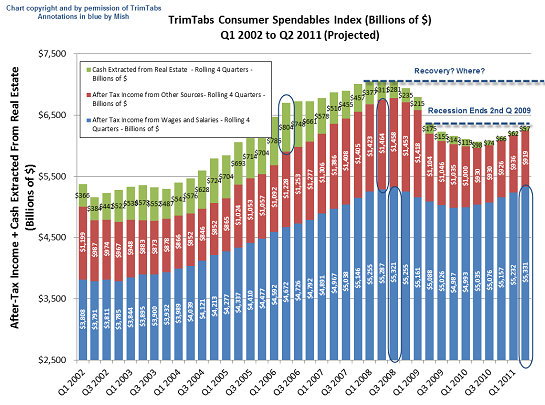
Note that Median Income of working-age households has fallen dramatically.
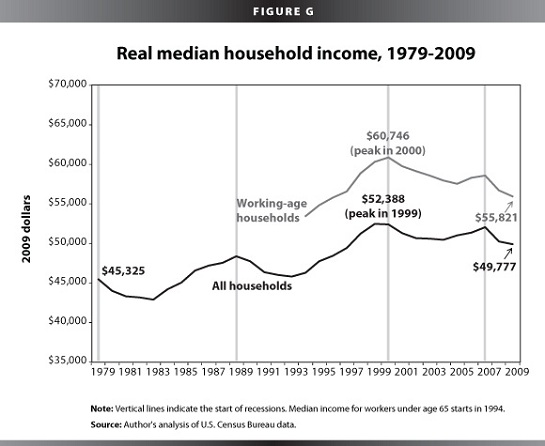
Employment has tanked.

If we look at the ratio of employed to the civilian population, the reality is even more sobering.
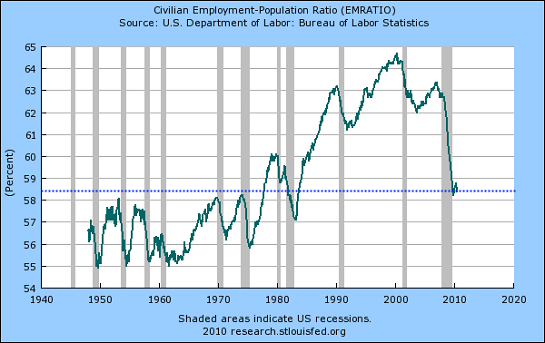
Employment per capita has also fallen off a cliff.
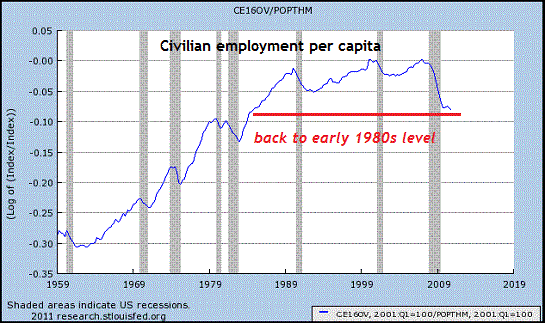
As a percentage of GDP, employee compensation (i.e. earned income) has collapsed to levels not seen in 50 years.
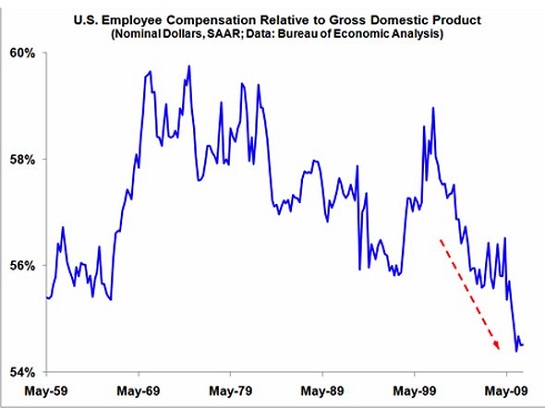
Here is a chart of the costs of financialization: staggering debt loads in every sector of the economy, public and private.
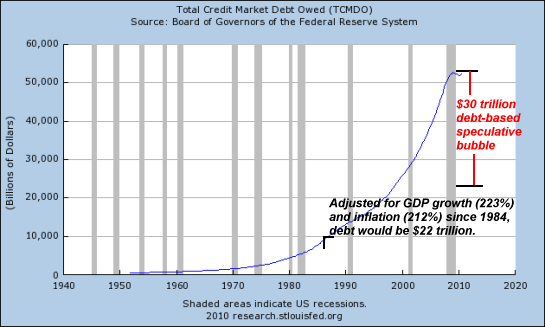
Keeping all those wars "hot" and all those transfers flowing while tax revenues tanked means Federal debt has skyrocketed.
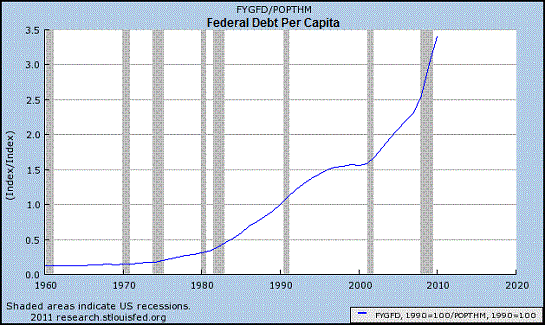
Households funded the past 30 years of consumption with debt.
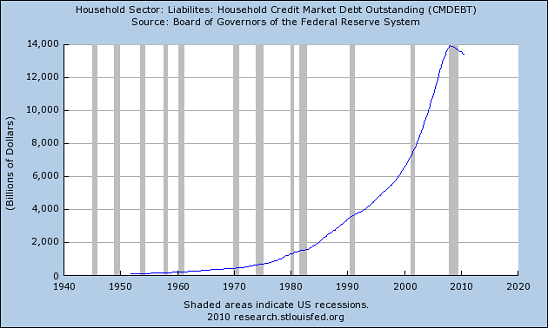
All that debt no longer adds to GDP "growth," it actually causes GDP to contract."Growth" based on exponential debt has run its course; marginal returns have turned negative. It's called debt saturation.
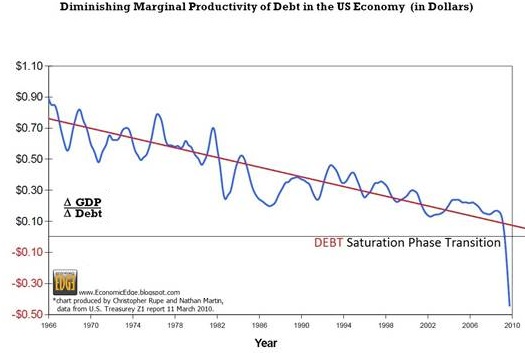
The real economy is still well below pre-recession levels of production.
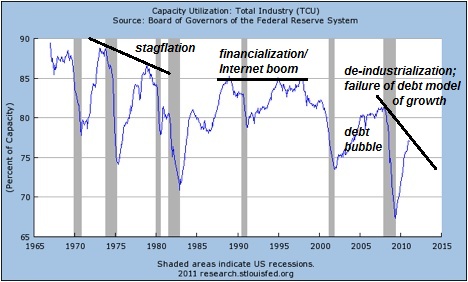
The financial media ignores rising taxes-- for example, property taxes, which continue to rise nationally even as the market value of real estate continues declining.
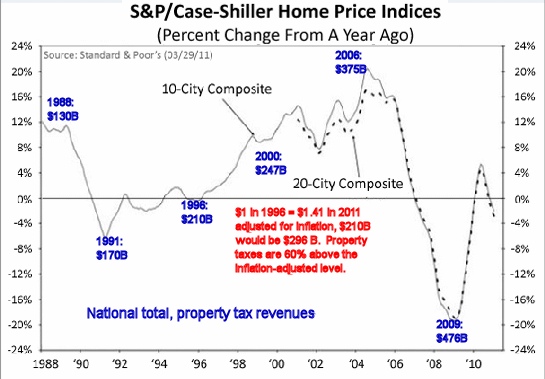
So let's add this up: less income, crushing debt loads, higher taxes (not to mention junk fees), no more "free money" from re-financing, and a Federal government that might not be able to borrow and blow 11% of GDP each and every year to prop up consumption.
The Darwinian struggle to strip the flesh from insolvent consumers before one's competitors do so is not a thriving economy nor a growing economy; it is a hollowed out economy at a dead-end of financialization and substitution of Federal debt for actual production.

If you're giving "store-bought" gifts this year:
And your gift-giving philosophy favors 1) everyday utility 2) durability/high quality 3) cost between $5 and $23, and 4) made in U.S.A. then this is the list for you: Favorite Practical Kitchen Tools (All Under $23, many under $10, most made in U.S.A.)
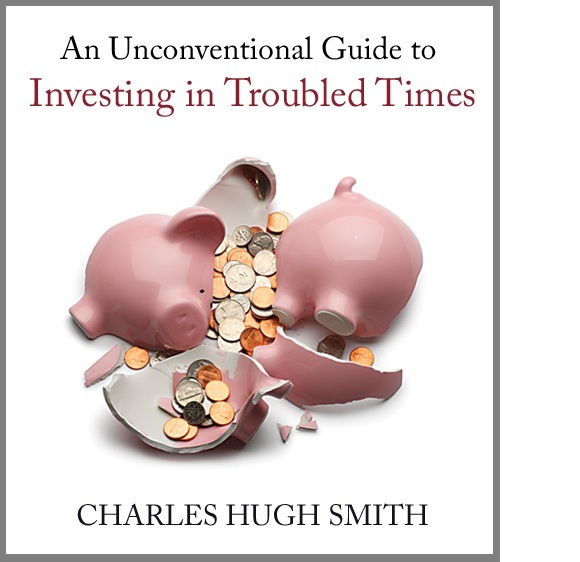
If this recession strikes you as different from previous downturns, you might be interested in my new book An Unconventional Guide to Investing in Troubled Times (print edition) or Kindle ebook format. You can read the ebook on any computer, smart phone, iPad, etc.Click here for links to Kindle apps and Chapter One. The solution in one word: Localism.
My Big Island Girl(fun, free MP3 song)
Readers forum:DailyJava.net.
Order Survival+: Structuring Prosperity for Yourself and the Nation (free bits) (Kindle) orSurvival+ The Primer (Kindle) or Weblogs & New Media: Marketing in Crisis (free bits)(Kindle) or from your local bookseller.
Of Two Minds Kindle edition: Of Two Minds blog-Kindle
| Thank you, Matthijs T.W. ($5/mo), for your remarkably generous subscription to this site-- I am greatly honored by your support and readership. |



























